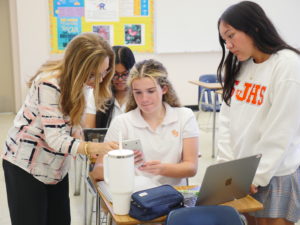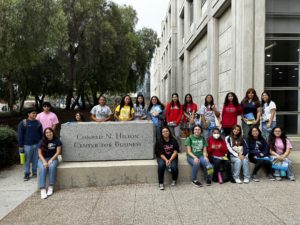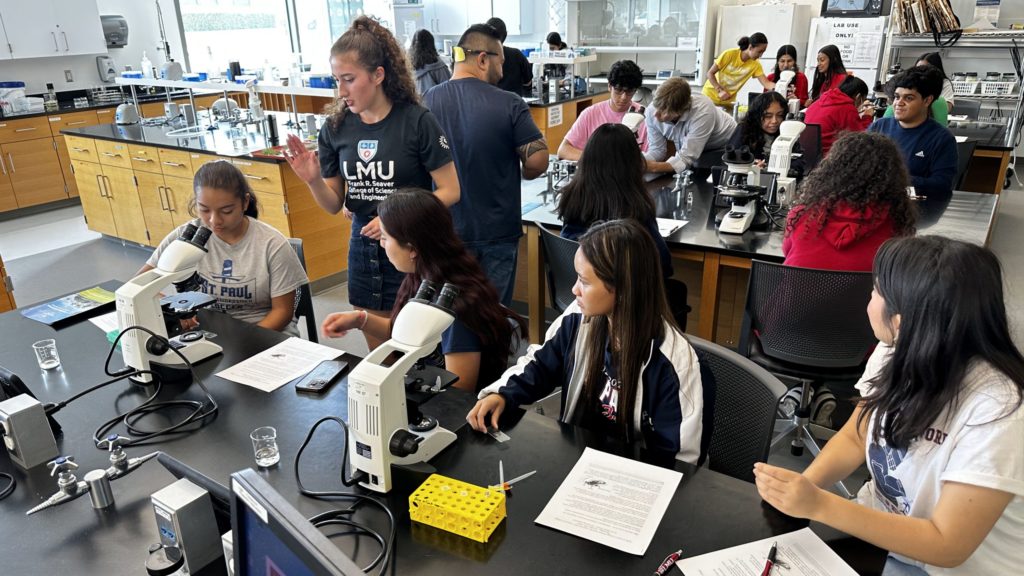Ava Ines was apprehensive about taking a college class online.
The summer before her first year of high school, she took an online course, “Global History to the Year 1500,” from Arizona State University (ASU) as a participant in the Early College Network (ECN), a program launched by the LA Archdiocese’s Department of Catholic Schools.
After a couple of weeks, Ines got the hang of the class.
“I really enjoyed the lessons and discussions,” said Ines, now a sophomore at St. Joseph High School in Lakewood whose dream job is to work for NASA’s Jet Propulsion Laboratory in Pasadena. “I’m truly grateful that there’s such a program that allows me to have a sneak peek into college.
“The experience has been so valuable to me because it is slowly preparing me for my future after high school.”
Launched in 2020 with initial partner ASU — and expanded to include Seton Hill, a four-year Catholic university in Pennsylvania — the ECN is expected to phase in four more high schools this academic year, expanding to 15 from 11 last year.
Nearly 1,000 students in the archdiocese are expected to take part in the ECN this year, said Edgar Salmingo Jr., director of Early College and Online Learning for the Department of Catholic Schools.
The ECN was made possible by a grant from the Conrad N. Hilton and Dan Murphy foundations — funding that covers course fees. In addition, students in the ECN taking ASU courses also earn an annual high school scholarship through the Hilton Foundation.

Although many public high schools and various Catholic high schools have entered partnerships to allow students to take college classes while still in high school, most of them are with community colleges and not four-year universities, Salmingo said.
The ECN program is designed to enhance high school transcripts, build the confidence of high school students to take college-level courses, and reduce their overall college costs.
“I’m not aware of any other diocese or archdiocese that has a formal, systemwide program like this,” Salmingo said.
Students in the ECN, which targets low-income, historically ethnically underrepresented, and first-generation prospective college students, can earn credit in math, science, English, social studies, Spanish, and other general electives.
“In a world where competition to get into college is so fierce,” Salmingo said, “we’re looking to provide every edge we can in the admissions process and to give these students the opportunity to succeed in and complete college.”
Sofia Medina, a third-year student at St. Paul High School in Santa Fe Springs, started in the ECN the summer of her sophomore year by taking an online ASU course, Psychology 101.
“Because the course was online,” Medina said, “I was able to pace myself with ease. By taking this and other college courses, I’ve learned time management, critical thinking, self-motivation, and discipline. The ECN program has allowed me to better myself academically and personally.”
ASU courses are only available online while Seton Hill courses utilize teachers from the archdiocese to teach its college-level classes during school hours. The ECN courses are open to all students in good standing.
One ECN participant, Ashley Suazo, is a standout. The 2024 graduate of Sacred Heart High School in Lincoln Heights completed two ASU certificates in one year, in project management and applied business data analytics.
Suazo was awarded a four-year scholarship to Rice University through the QuestBridge National College Match program, which connects high-achieving, low-income, first-generation students to top universities with full-ride scholarships.

“The ECN program allowed me to advance in my studies,” Ashley said. “I learned valuable knowledge and skills that will help in my career. I enjoyed the flexibility of the courses. I’m thankful for the support I received from the ECN in completing these mastery certificates.
“ECN is an amazing opportunity that all students should optimize.”
In addition to Sacred Heart, St. Joseph, and St. Paul high schools, the ECN includes Cantwell-Sacred Heart of Mary (Montebello), San Gabriel Mission (San Gabriel), Santa Clara (Oxnard) St. Pius X-St. Matthias Academy (Downey), Bishop Mora Salesian (Los Angeles), St. Anthony (Long Beach), St. Joseph (Santa Maria) and St. Bonaventure (Ventura).
It’s clear that the program is having an impact.
Last year, around 85% of participating students in ECN courses were from historically underrepresented minority groups, Salmingo said.
In the 2023-2024 school year, 507 ECN students completed 1,088 courses and earned 3,251 college credits.
Because those courses were taken in high school, Salmingo said those students saved:
- $1,040,320, if they took their courses at a Cal State university as an undergraduate.
- $1,362,169, if they took their courses at a UC school as an undergraduate.
- $5,633,983, if they took their courses at USC as an undergraduate.
Ines plans to complete three more ECN courses this year.
“It might be scary at first,” she said, “but I would tell students to not be intimidated by the amount of work or content.”
Medina, meanwhile, plans to take some Seton Hill classes this academic year and hopes to major in psychology and become a child psychologist.
“I highly recommend this program,” she said.

